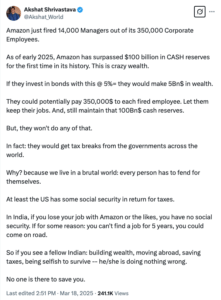A Personal Perspective on Amazon Layoffs and Business Choices
Amazon, the world’s biggest company, has recently layoff 18000 employees in November, in various departments. This action has everyone wondering why a highly successful company is laying off employees and how the layoffs are affecting employees and their families. Amazon’s decision to lay off 14,000 more employees, following the November layoff, has drawn big criticism, majorly for its use of corporate jargon and AI-driven job cuts. Let’s look at what is occurring and why.

Amazon Layoffs: What’s Going On?
Amazon has been letting employees go in various areas of the company, such as offices, warehouses, and its podcasting division. The company indicates it is attempting to cut costs, become more efficient, and shift its business strategies. Following are some of the key facts:
Managers Losing Their Jobs: In January 2025, Amazon let go of 14,000 managers out of its 350,000 corporate employees. The goal is to eliminate middle management and accelerate decision-making.
Podcasting Cuts: Wondery, the podcast production company behind titles like Dr. Death, has seen cuts to jobs, predominantly in content and advertising.
Amazon is shutting down all seven of its Quebec fulfilment centers, which will eliminate 1,700 permanent positions and 250 seasonal positions.
Corporate Headquarters Staff Layoffs: Approximately 200 employees, primarily in the Fashion and Fitness segments, have been terminated.
Return-to-Office Policy Causing Issues: Amazon now requires employees to report to the office five days a week. This has drawn protests and even some employees resigning.
What are people saying about these layoffs?
Experts believe that Amazon layoffs are just a part of a larger trend. Large corporations are rethinking how many workers to employ due to economic volatility and emerging technology.
Amazon Chief Executive Andy Jassy has explained the layoffs as the company wants to expand in the long term. The workers and industry experts, however, feel the job cuts are more for cost-cutting and less for improving the workplace.
In India, workers’ unions are concerned that Amazon is violating labor laws by making the employees think that they must resign rather than being fired appropriately. Most employees feel powerless when it comes to these layoffs.
The Contribution of Technology to Job Losses
One of the key reasons for the layoffs at Amazon is its growing reliance on artificial intelligence (AI) and automation. These have been rendering some jobs obsolete. Here’s how:
Warehouses: More work that was done by people is being done by robots, so there are fewer jobs in warehouses.
Customer Service: Chatbots respond to customer queries, so fewer customer support staff are needed.
Management Positions: AI is replacing decision-making responsibilities from middle-level managers, and that is resulting in numerous layoffs.
The Impact on Families
The job loss affects not just the employees but also their families. Job loss can cause financial difficulties, stress, and concern about the future. Most of the employees have mortgages, student loans, or dependents to take care of, so it is difficult to cope with losing their job suddenly.
Families may have financial constraints and have to relocate or reduce expenditure, often with other families having substantial financial issues. Apart from money, uncertainty about employment can generate anxiety, emotional tension, and domestic relationship issues.
A Harsh Reality: Corporate Success vs. Worker Welfare
Akshat Shrivastav, an investor and YouTuber, posted on the social media platform X, “By early 2025, Amazon reached a record-high $100 billion in cash reserves—the all-time high. It is a lot of money, but the company still went on and cut thousands of employees.”

That is, if Amazon invested this money in 5% interest bonds, it would easily earn $5 billion in interest annually. That would be sufficient to pay $350,000 to each of the laid-off employees and still retain its $100 billion cash reserves. But Amazon won’t.
Instead, the firm will continue to be exempted from taxes by governments worldwide, proving that businesses are more concerned with profits and shareholders than employees.
In America, there are unemployment benefits for the unemployed, but India does not offer these benefits. If an Amazon worker in India loses his job and cannot find another job for five years, he might have nothing. This is a difficult situation that is the reason why Indians work extremely hard, go to other countries, and lower their taxes—it’s a struggle in which no one is helping them.
Humans are more valuable than machines.
It is true that technology makes companies operate more efficiently, but ultimately, companies rely on humans. Employees bring creativity, problem-solving, and dedication—things that machines cannot do completely. Companies that take care of their employees and treat them well will always be in a better position than others in the long term.
Technology can assist individuals but not displace them without regard to their interests. Companies with more concern for their employees than for quickly saving money will establish stronger, more loyal staff with a propensity to foster new thoughts and prosperity.
Public Reactions to the Layoffs
The redundancies have elicited controversial reactions, particularly on social networks such as Twitter. Individuals criticized the employment of jargon terminologies by business firms and the redundancies by virtue of using AI, where the loss of middle management and its impact on the welfare of employees has come up.
On LinkedIn, professionals have criticized the way Amazon treats its employees. For instance, Gurmeet Chadha, Comp Circle CIO, criticized Amazon’s practice, referring to the disconnect between job titles such as “People Experience Head” and the way the employees are treated. He again emphasized that innovation has to be people’s welfare-driven, referring to Guru Nanak Devji’s application of “Sarbat da bhalla” (all people’s welfare).
Also, on Reddit, various opinions are debated. Some point out that the layoffs are a part of a larger trend of the industry, whereas others are concerned about how it would impact the morale of the employees and job security.
What’s Next for Amazon Employees?
Amazon’s layoffs are just one part of a larger trend of cost-cutting and automation in industries. Employees need to be open to learning new skills and being flexible.
As Amazon continues to evolve, only time will tell if the company will be more concerned with its workers or will continue to prioritize automation and efficiency.
Final Thoughts
The recent layoffs at Amazon are a prime example of how businesses operate—first making money and being efficient, and then taking care of individuals. As technology transforms businesses, we must not forget the people cost of such transformations. What do you make of Amazon’s layoffs? Do they need them for the company to expand, or do they indicate that the company doesn’t care about the workers? Give your thoughts in the comments!
For more such interesting articles on Current Affairs: Please check the Current Affairs Section.


